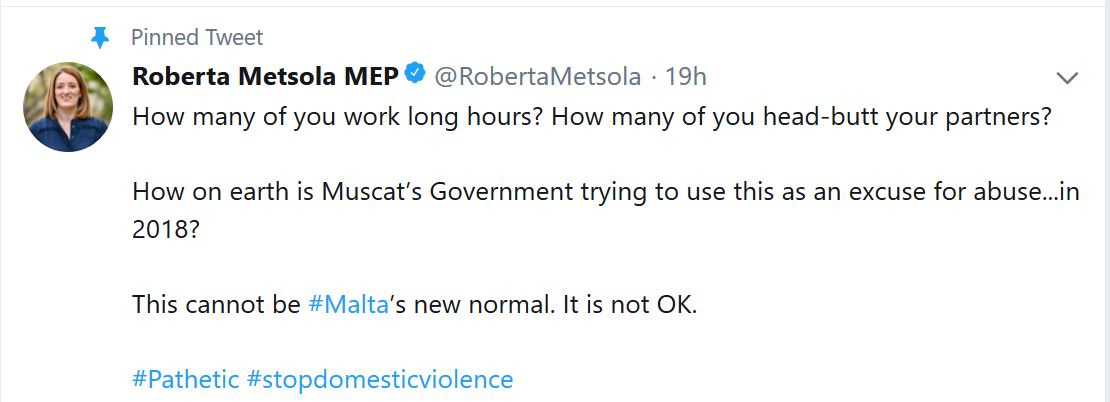Home Affairs Minister Michael Farrugia yesterday defended Mario Tonna, a former assistant police commissioner who was forced to resign the previous day after reports emerged that his wife had filed a police report against him for domestic violence.
Farrugia defended Tonna as a “hard-working officer who worked long hours” despite his wife’s claim that she had been head-butted by her policeman partner. The ministry added in the press statement that the police report had since been withdrawn, describing the woman as a “third party”.
The ministry tried to backtrack later in the day by issuing a statement saying the Ministry condemned all forms of domestic violence. But the damage had already been done.
In September 2012, Joseph Muscat, then Opposition Leader, pledged that a new Labour government would be Malta’s most feminist government in history. Fast forward five years and women remain anonymous third parties in a society dominated by “hard-working” men.
Domestic violence is still a reality in far too many Maltese households. A recent study presented by Maltese academic Clarissa Sammut Scerri at the launch of a domestic abuse prevention strategy in November 2017 found that as many as 26 per cent of women surveyed experienced emotional or physical violence in their lifetime.
More worryingly, a survey carried out by the European Commission found that 47 per cent. of Maltese believe that women make up or exaggerate claims of abuse or rape. In addition, 40 per cent of respondents thought that violence against women was often provoked by the victim.
Women find no respite on the economic front either. Another study carried out by the European Commission found that the gender earnings gap in Malta is the second highest in the EU with 45.6 percent, compared to a European average of a 39.6 per cent.
Following the June 2017 election, Malta retained its spot at the bottom of the rankings for female representation in Parliament in an EU member state. The share of female members of Parliament was even lower when compared to the previous legislature.
The few women in Parliament do not have the easiest times. Marlene Farrugia, formerly a Labour MP who split from the party in 2015, was verbally threatened with violence by Labour veteran MP Joe Debono Grech after she reportedly called him a corrupt simpleton. Debono Grech was awarded the National Order of Merit during the 2017 Republic Day celebrations.
Last year, Malta also witnessed the murder of Daphne Caruana Galizia, an investigative journalist, also a woman.
Shortly after the murder, government consultant and former union leader Tony Zarb implied that a group of women from Occupy Justice protesting in front of Castille were prostitutes. He remains a government consultant.
The government is credited with some initiatives to improve the lot of women: A new law on domestic abuse that is intended to align Malta’s laws with the requirements of the Istanbul Convention is currently making its way through Parliament. This development was heralded by Nils Muižnieks, the Council of Europe Commissioner for Human Rights, as a decisive step forward, although more needed to be done.
The few positive developments on women’s rights that occurred during Muscat’s first term also include the legalisation of the morning after pill. Working mothers, who normally take the lion’s share of responsibility of raising children in their early years, can also access free childcare.
Yet, these developments are easily undone by retrograde politicians who, when faced with a choice between an alleged aggressor and an alleged victim of domestic violence, choose the former.
Prime Minister Joseph Muscat needs to lead by example and show that there is no place in society for an attitude that enables even more violence. The standard expected from Muscat is very high: The political establishment around the world has started treating abuse and harassment very seriously. In the UK alone two ministers lost their job in recent weeks because of allegations of harassment or inappropriate behaviour.
The responsibility towards women does not stop at Muscat only. Labour also needs to show that there is no space for misogyny and complacency. Joe Debono Grech, Tony Zarb and Michael Farrugia make an alarming trend. Politicians as minister Helena Dalli, parliamentary secretary Julia Farrugia and MEP Miriam Dalli have a responsibility to speak up, being seen on the socially liberal side of Labour.
The Nationalist Party has sought to gain political mileage out of Farrugia’s words. However it too needs to come clean with women for failing to promote a more female friendly agenda during its time in government. The party also needs to develop a policy on women’s rights (including, incidentally, lesbians).
Michael Farrugia has shown that he belongs to the nineteenth century and deserves to go. It is up to his colleagues in politics to show where Malta belongs.












